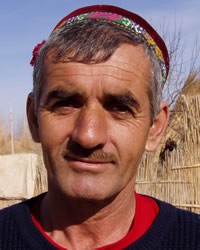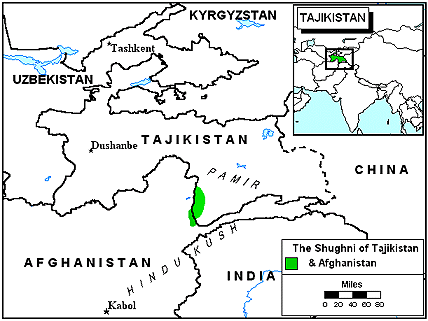The Shughnis were mentioned in Chinese chronicles from the sixth and seventh centuries. According to these, they always kept the trade route through Shughnan under their control. Stories speak of the Shughnis being warlike people who used to raid caravans. In some places, these legends are still passed on.
The Shughni are of the Tajik people cluster. The Shughni are also known as Kushani, Shugnan-Rush, or the Shugnan Rushan. Their primary language is Shughni. They live on both sides of the Tajikistan and Afghanistan border, mostly in the Pamir mountains 30 miles north of Ishkashim. Badakshan Province and Kabul has the largest populations of these people in Afghanistan.
Most Shughni settlements consist of several extended families that share a common male ancestry. The villages are generally situated along river deltas or river terraces. The small village, or kishlak, is designed much like a town square. All the buildings face an inner courtyard, and the external walls are connected to close off the square to the outside. The houses within the village have stone walls and wooden roofs. The roofs are supported by wooden columns, with the main column, or shastan, being decorated with carvings. Today Shughni people are beginning to build separate and elegantly decorated houses. Since Ismaili Islam (their preferred sect) has no mosques, the public center of the village is a common house called the "house of five." This building serves as a place for communal feasting and marriages or as a type of men's club.
Shughni life is based on agriculture, with grains and legumes being the main crops. When the terrain allows, the Shughni plow, plant and harvest with mechanical equipment. However, remote areas still require the traditional ox and plow methods.
Cattle, sheep and goats are also vital to Shughni economy. Dried fruit is a popular supplement to a diet that consists mainly of grain and milk products and, occasionally, meat. The Shughni are known for their hand-crafted textiles, such as rugs and woolen cloth. They are also distinguished by the high quality of their wooden vessels and pottery. Some of them are traders in the few cities of their region.
Traditionally, the Shughni marry their first or second cousins of either the father's or mother's lineage. Maternal uncles are often involved in the arrangement of marriages. Until recently, the age of marriage was 15 years of age for girls. Now the acceptable age has been raised to either 18 or when the girl finishes her education. Today, both young men and women have opportunities for higher education.
The ethnic identity of the Shughni is based upon religion. Since the eleventh century, they have belonged to the Ismaili sect of Shia Islam. This religious group follows the Aga Khan and is also known as the "Seveners." They believe that important cosmic and historical events occur in series of seven. Their doctrine is very secretive and private, understood by the select few. Ismailis have no mosques or official clerics, but private houses of prayer and itinerant clergy are numerous. Overall, Ismailis actively labor to gain followers and even send out missionaries to other Islamic groups. The Shughni isolate themselves from all Tajik people who have adopted Sunni Islam.
The Shughni people need to hear that Jesus Christ offers them so much more than they can imagine for this life and the life to come.
Pray for a spiritual hunger among the Shughni people that will drive them to seek and find the only savior.
Pray for the Lord to give the Shughni people dreams and visions of Christ that will open them spiritually.
Pray for Shughni disciples to make other disciples.
Pray for spiritually anointed followers of Christ to take his name to the Shughni people.
Scripture Prayers for the Shughni, Shugnan-Rushan in Tajikistan.
https://en.wikipedia.org/wiki/Shughni_people
| Profile Source: Joshua Project |











